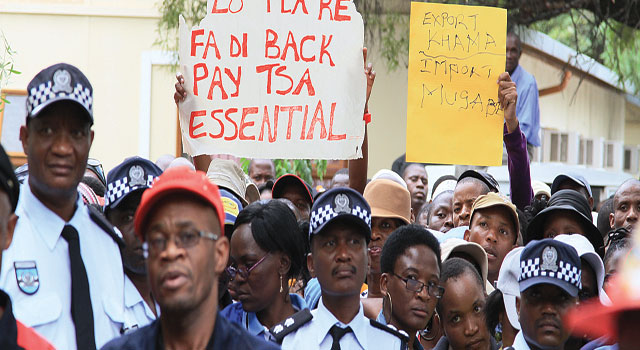Economists posit that the demand for labour is the result of the demand for the goods that are produced by labour. This in other words means that if all things are held constant, when demand for goods increases they expect that likewise the demand for labour will increase. Typically, the labour market is the interaction between the demand for labour and the supply of it, which is what determines the creation of jobs as well as of wages.
Within this interaction is the existence of unions which generally protect the interests of workers. The trend that has emerged in the past few years in the labour market is, according to Economics specialist at the University of Botswana, Happy Siphambe, reflective of changes from it being a process of consultation to now being about negotiation with particular reference to the public sector.
Speaking at the Botswana Public Employees Union (BOPEU)’s budget analysis breakfast meeting on Friday, Siphambe highlighted the tenuous relationship between public sector employees and the government of Botswana, which is the largest employer in the country. He revealed that Botswana in regard to this labour relationship, is going through a transitioning phase where it will need to create a new environment for better engagement with these unions.
Giving the workers’ perspective on labour market issues, BOPEU’s President Andrew Motsamai stressed that government undermines the bargaining process because of its lack of participation in reaching an agreement which as a result gives the impression that unions are to blame for the delay. “What is the problem is that it (government) appears to be couched at a rigid offer (4%), with no intention to move. If that is the case, it would mean bargaining is a formality, where government goes through the motion but with no objective to reach a settlement, but rather with intent to force unions to accept its offer,” he said.
Unions on the other hand believe that the salary adjustment could be accommodated in the budget surplus. Associate Professor at the University of Botswana Brothers Malema acknowledged the explicitly sour relationship between the employer and unions to which he suggested that as a way forward, a participatory partnership will need to come into force. Malema added that the acidic interaction which has been ongoing since 2008 is a likely cause of deteriorating productivity. Motsamai gave other examples from the 2015/16 budget speech which appear to belittle workers such as the general claim that total factor productivity has dwindled due to declining labour productivity. “Perhaps because labour productivity is a very dynamic issue, it is not just about laziness. Some of the causes include poor skills, conflicting industrial relations. For instance, how would we expect a worker owed two months’ pay to be productive? And for the Minister to say labor productivity is the problem, is an issue we may want to take up with him, to understand where he comes from,” said Motsamai.
Suggesting the labour approach to development issues, Motsamai proclaimed that there is need for a strong political will to shift the economy from being more reliant on machines to one that increases the use of labour in a broad sense. He also argued for government’s urgent attention on establishing a deliberate procurement policy that supports and favours local industry (industrialization) as well as encouraging businesses to set up in Botswana with intent to grow the economy and thus create jobs.
While recognizing the need to employ more people than machines, Malema however pointed out that it would only be applicable in the public sector. Contrary to the public sector, he said private sector’s motive is to get value for money and therefore the choice of production method is largely dependent on whether it guarantees return on investment.

